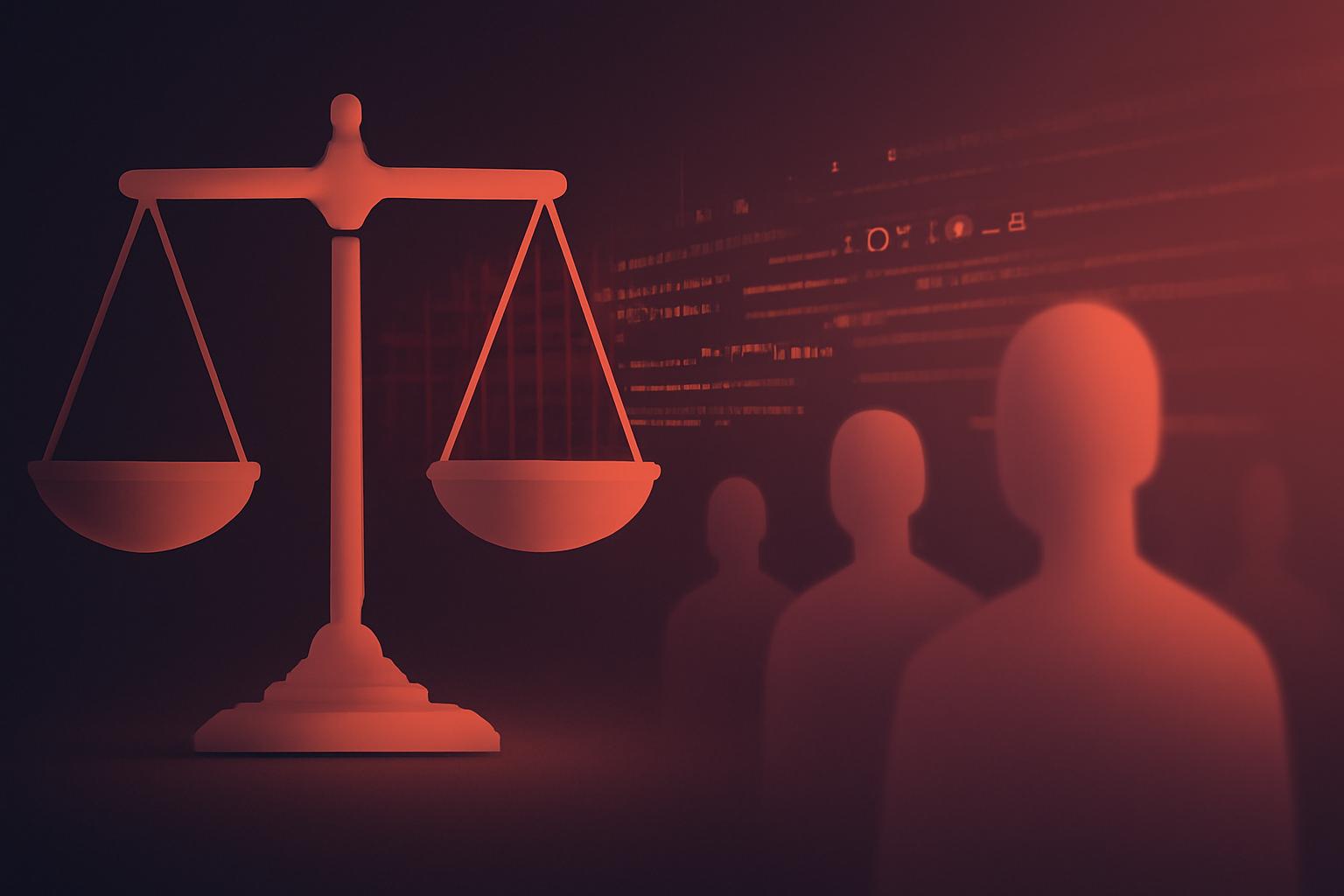Anthropic’s settlement represents a pivotal moment for AI companies regarding copyright compliance and data sourcing. The substantial financial commitment signals increasing legal risks associated with unlicensed training data, while also setting a precedent for how AI startups might navigate intellectual property challenges. !-- wp:paragraph -->
Contents
FinOracleAI — Market ViewFinOracleAI — Market ViewFinOracleAI — Market ViewSettlement Terms and Judicial ReviewFinOracleAI — Market ViewSettlement Terms and Judicial ReviewFinOracleAI — Market ViewBackground on Anthropic and the Legal ChallengeSettlement Terms and Judicial ReviewFinOracleAI — Market ViewBackground on Anthropic and the Legal ChallengeSettlement Terms and Judicial ReviewFinOracleAI — Market ViewAnthropic Reaches Preliminary $1.5 Billion Settlement in Landmark Copyright CaseBackground on Anthropic and the Legal ChallengeSettlement Terms and Judicial ReviewFinOracleAI — Market View
- Opportunities: Clearer legal frameworks may encourage ethical AI development and foster trust with content creators.
- Risks: High settlement costs and ongoing legal scrutiny could impact AI firms’ valuation and operational strategies.
- Potential for increased industry-wide licensing agreements or alternative data sourcing models.
- Heightened regulatory focus on AI training data and copyright enforcement.
FinOracleAI — Market View
Anthropic’s settlement represents a pivotal moment for AI companies regarding copyright compliance and data sourcing. The substantial financial commitment signals increasing legal risks associated with unlicensed training data, while also setting a precedent for how AI startups might navigate intellectual property challenges. !-- wp:paragraph -->- Opportunities: Clearer legal frameworks may encourage ethical AI development and foster trust with content creators.
- Risks: High settlement costs and ongoing legal scrutiny could impact AI firms’ valuation and operational strategies.
- Potential for increased industry-wide licensing agreements or alternative data sourcing models.
- Heightened regulatory focus on AI training data and copyright enforcement.
“We are pleased with the Court’s determination. This settlement simply resolves narrow claims about how certain materials were obtained,” said Aparna Sridhar, Anthropic’s deputy general counsel. Sridhar emphasized that the resolution allows Anthropic to focus on advancing safe AI systems that enhance human capabilities and scientific progress.
!-- wp:paragraph -->FinOracleAI — Market View
Anthropic’s settlement represents a pivotal moment for AI companies regarding copyright compliance and data sourcing. The substantial financial commitment signals increasing legal risks associated with unlicensed training data, while also setting a precedent for how AI startups might navigate intellectual property challenges. !-- wp:paragraph -->- Opportunities: Clearer legal frameworks may encourage ethical AI development and foster trust with content creators.
- Risks: High settlement costs and ongoing legal scrutiny could impact AI firms’ valuation and operational strategies.
- Potential for increased industry-wide licensing agreements or alternative data sourcing models.
- Heightened regulatory focus on AI training data and copyright enforcement.
“We are pleased with the Court’s determination. This settlement simply resolves narrow claims about how certain materials were obtained,” said Aparna Sridhar, Anthropic’s deputy general counsel. Sridhar emphasized that the resolution allows Anthropic to focus on advancing safe AI systems that enhance human capabilities and scientific progress.
!-- wp:paragraph -->FinOracleAI — Market View
Anthropic’s settlement represents a pivotal moment for AI companies regarding copyright compliance and data sourcing. The substantial financial commitment signals increasing legal risks associated with unlicensed training data, while also setting a precedent for how AI startups might navigate intellectual property challenges. !-- wp:paragraph -->- Opportunities: Clearer legal frameworks may encourage ethical AI development and foster trust with content creators.
- Risks: High settlement costs and ongoing legal scrutiny could impact AI firms’ valuation and operational strategies.
- Potential for increased industry-wide licensing agreements or alternative data sourcing models.
- Heightened regulatory focus on AI training data and copyright enforcement.
Settlement Terms and Judicial Review
Anthropic’s settlement proposal includes payments of roughly $3,000 per book plus interest and a commitment to destroy the datasets containing the disputed materials. This offer was initially met with judicial concerns regarding the notification process for authors. !-- wp:paragraph --> U.S. District Judge William Alsup, after several weeks of detailed evaluation, has now granted preliminary approval, with final authorization contingent on completion of the notice and claims procedures. !-- wp:paragraph -->“We are pleased with the Court’s determination. This settlement simply resolves narrow claims about how certain materials were obtained,” said Aparna Sridhar, Anthropic’s deputy general counsel. Sridhar emphasized that the resolution allows Anthropic to focus on advancing safe AI systems that enhance human capabilities and scientific progress.
!-- wp:paragraph -->FinOracleAI — Market View
Anthropic’s settlement represents a pivotal moment for AI companies regarding copyright compliance and data sourcing. The substantial financial commitment signals increasing legal risks associated with unlicensed training data, while also setting a precedent for how AI startups might navigate intellectual property challenges. !-- wp:paragraph -->- Opportunities: Clearer legal frameworks may encourage ethical AI development and foster trust with content creators.
- Risks: High settlement costs and ongoing legal scrutiny could impact AI firms’ valuation and operational strategies.
- Potential for increased industry-wide licensing agreements or alternative data sourcing models.
- Heightened regulatory focus on AI training data and copyright enforcement.
Settlement Terms and Judicial Review
Anthropic’s settlement proposal includes payments of roughly $3,000 per book plus interest and a commitment to destroy the datasets containing the disputed materials. This offer was initially met with judicial concerns regarding the notification process for authors. !-- wp:paragraph --> U.S. District Judge William Alsup, after several weeks of detailed evaluation, has now granted preliminary approval, with final authorization contingent on completion of the notice and claims procedures. !-- wp:paragraph -->“We are pleased with the Court’s determination. This settlement simply resolves narrow claims about how certain materials were obtained,” said Aparna Sridhar, Anthropic’s deputy general counsel. Sridhar emphasized that the resolution allows Anthropic to focus on advancing safe AI systems that enhance human capabilities and scientific progress.
!-- wp:paragraph -->FinOracleAI — Market View
Anthropic’s settlement represents a pivotal moment for AI companies regarding copyright compliance and data sourcing. The substantial financial commitment signals increasing legal risks associated with unlicensed training data, while also setting a precedent for how AI startups might navigate intellectual property challenges. !-- wp:paragraph -->- Opportunities: Clearer legal frameworks may encourage ethical AI development and foster trust with content creators.
- Risks: High settlement costs and ongoing legal scrutiny could impact AI firms’ valuation and operational strategies.
- Potential for increased industry-wide licensing agreements or alternative data sourcing models.
- Heightened regulatory focus on AI training data and copyright enforcement.
“We are grateful for the Court’s action today, which brings us one step closer to real accountability for Anthropic and puts all AI companies on notice they can’t shortcut the law or override creators’ rights,” the authors stated in a joint release.Background on Anthropic and the Legal Challenge
Anthropic, founded in 2021 by former OpenAI executives including CEO Dario Amodei, is a leading AI startup valued at approximately $183 billion. The company is best known for its AI assistant Claude. !-- wp:paragraph --> The case has attracted significant attention across the AI and media industries, as it highlights critical questions about copyright infringement and the ethical use of training data in AI development. !-- wp:paragraph -->Settlement Terms and Judicial Review
Anthropic’s settlement proposal includes payments of roughly $3,000 per book plus interest and a commitment to destroy the datasets containing the disputed materials. This offer was initially met with judicial concerns regarding the notification process for authors. !-- wp:paragraph --> U.S. District Judge William Alsup, after several weeks of detailed evaluation, has now granted preliminary approval, with final authorization contingent on completion of the notice and claims procedures. !-- wp:paragraph -->“We are pleased with the Court’s determination. This settlement simply resolves narrow claims about how certain materials were obtained,” said Aparna Sridhar, Anthropic’s deputy general counsel. Sridhar emphasized that the resolution allows Anthropic to focus on advancing safe AI systems that enhance human capabilities and scientific progress.
!-- wp:paragraph -->FinOracleAI — Market View
Anthropic’s settlement represents a pivotal moment for AI companies regarding copyright compliance and data sourcing. The substantial financial commitment signals increasing legal risks associated with unlicensed training data, while also setting a precedent for how AI startups might navigate intellectual property challenges. !-- wp:paragraph -->- Opportunities: Clearer legal frameworks may encourage ethical AI development and foster trust with content creators.
- Risks: High settlement costs and ongoing legal scrutiny could impact AI firms’ valuation and operational strategies.
- Potential for increased industry-wide licensing agreements or alternative data sourcing models.
- Heightened regulatory focus on AI training data and copyright enforcement.
“We are grateful for the Court’s action today, which brings us one step closer to real accountability for Anthropic and puts all AI companies on notice they can’t shortcut the law or override creators’ rights,” the authors stated in a joint release.Background on Anthropic and the Legal Challenge
Anthropic, founded in 2021 by former OpenAI executives including CEO Dario Amodei, is a leading AI startup valued at approximately $183 billion. The company is best known for its AI assistant Claude. !-- wp:paragraph --> The case has attracted significant attention across the AI and media industries, as it highlights critical questions about copyright infringement and the ethical use of training data in AI development. !-- wp:paragraph -->Settlement Terms and Judicial Review
Anthropic’s settlement proposal includes payments of roughly $3,000 per book plus interest and a commitment to destroy the datasets containing the disputed materials. This offer was initially met with judicial concerns regarding the notification process for authors. !-- wp:paragraph --> U.S. District Judge William Alsup, after several weeks of detailed evaluation, has now granted preliminary approval, with final authorization contingent on completion of the notice and claims procedures. !-- wp:paragraph -->“We are pleased with the Court’s determination. This settlement simply resolves narrow claims about how certain materials were obtained,” said Aparna Sridhar, Anthropic’s deputy general counsel. Sridhar emphasized that the resolution allows Anthropic to focus on advancing safe AI systems that enhance human capabilities and scientific progress.
!-- wp:paragraph -->FinOracleAI — Market View
Anthropic’s settlement represents a pivotal moment for AI companies regarding copyright compliance and data sourcing. The substantial financial commitment signals increasing legal risks associated with unlicensed training data, while also setting a precedent for how AI startups might navigate intellectual property challenges. !-- wp:paragraph -->- Opportunities: Clearer legal frameworks may encourage ethical AI development and foster trust with content creators.
- Risks: High settlement costs and ongoing legal scrutiny could impact AI firms’ valuation and operational strategies.
- Potential for increased industry-wide licensing agreements or alternative data sourcing models.
- Heightened regulatory focus on AI training data and copyright enforcement.
Anthropic Reaches Preliminary $1.5 Billion Settlement in Landmark Copyright Case
A federal judge in the Northern District of California has given preliminary approval to Anthropic’s $1.5 billion settlement offer in a class action copyright lawsuit brought by a group of authors. This settlement represents the largest publicly reported copyright recovery to date, underscoring the growing legal scrutiny around data usage in artificial intelligence development. !-- wp:paragraph --> The lawsuit, initiated last year by authors Andrea Bartz, Charles Graeber, and Kirk Wallace Johnson, alleges that Anthropic unlawfully downloaded books from pirated sources such as Library Genesis and Pirate Library Mirror to train its AI models. !-- wp:paragraph -->“We are grateful for the Court’s action today, which brings us one step closer to real accountability for Anthropic and puts all AI companies on notice they can’t shortcut the law or override creators’ rights,” the authors stated in a joint release.Background on Anthropic and the Legal Challenge
Anthropic, founded in 2021 by former OpenAI executives including CEO Dario Amodei, is a leading AI startup valued at approximately $183 billion. The company is best known for its AI assistant Claude. !-- wp:paragraph --> The case has attracted significant attention across the AI and media industries, as it highlights critical questions about copyright infringement and the ethical use of training data in AI development. !-- wp:paragraph -->Settlement Terms and Judicial Review
Anthropic’s settlement proposal includes payments of roughly $3,000 per book plus interest and a commitment to destroy the datasets containing the disputed materials. This offer was initially met with judicial concerns regarding the notification process for authors. !-- wp:paragraph --> U.S. District Judge William Alsup, after several weeks of detailed evaluation, has now granted preliminary approval, with final authorization contingent on completion of the notice and claims procedures. !-- wp:paragraph -->“We are pleased with the Court’s determination. This settlement simply resolves narrow claims about how certain materials were obtained,” said Aparna Sridhar, Anthropic’s deputy general counsel. Sridhar emphasized that the resolution allows Anthropic to focus on advancing safe AI systems that enhance human capabilities and scientific progress.
!-- wp:paragraph -->FinOracleAI — Market View
Anthropic’s settlement represents a pivotal moment for AI companies regarding copyright compliance and data sourcing. The substantial financial commitment signals increasing legal risks associated with unlicensed training data, while also setting a precedent for how AI startups might navigate intellectual property challenges. !-- wp:paragraph -->- Opportunities: Clearer legal frameworks may encourage ethical AI development and foster trust with content creators.
- Risks: High settlement costs and ongoing legal scrutiny could impact AI firms’ valuation and operational strategies.
- Potential for increased industry-wide licensing agreements or alternative data sourcing models.
- Heightened regulatory focus on AI training data and copyright enforcement.













